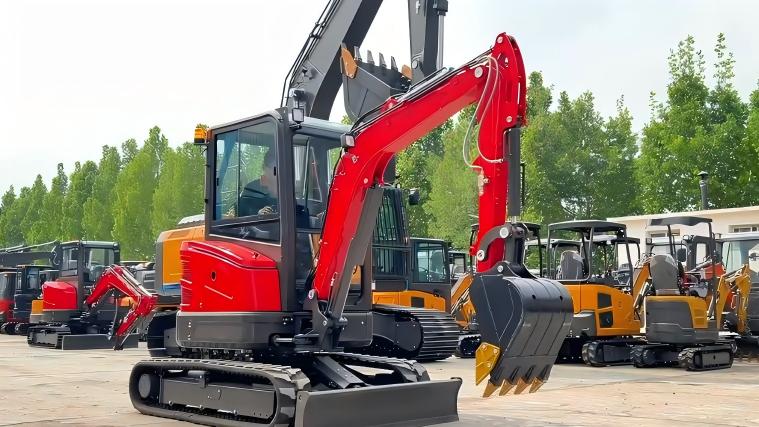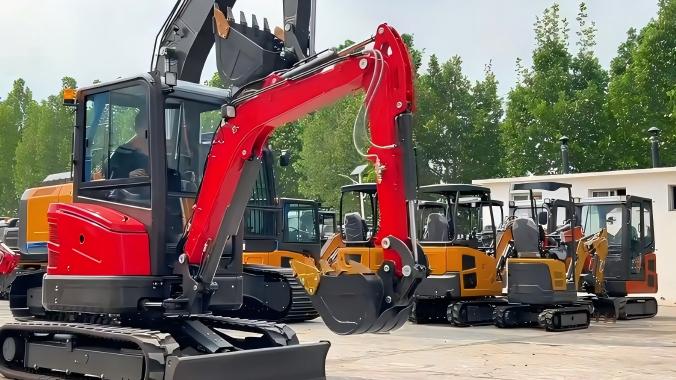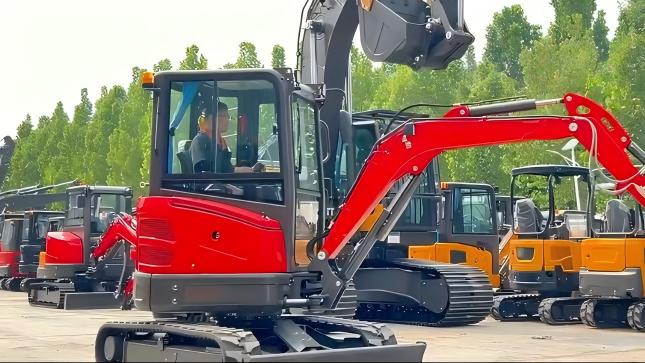Mini excavators have become a go-to machine for landscapers, contractors, utility workers, and even homeowners tackling ambitious DIY projects. Their compact size combined with surprising power and versatility makes them incredibly valuable for tasks like digging trenches, grading, clearing land, breaking concrete, and much more. However, before investing in one, a crucial question arises: "How much does a mini excavator cost?"
The answer isn't straightforward, as the price of a mini excavator can vary wildly, ranging from a few thousand dollars for a very old, well-used model to well over $100,000 for a brand-new, top-of-the-line machine with all the bells and whistles. This article will break down the various factors that influence the cost of a mini excavator, covering new versus used options, brand reputation, size, attachments, and the often-overlooked ongoing ownership expenses.
New Mini Excavator Costs
Purchasing a brand-new mini excavator offers the benefits of modern technology, a full warranty, and the latest safety features. However, it comes with the highest upfront cost.
Price Range for New Mini Excavators (as of mid-2025):
1-2 Ton Models: These are the smallest and most compact mini excavators, ideal for tight spaces, light landscaping, and homeowner projects.
Price Range: $30,000 - $60,000
Examples: Bobcat E10, Kubota K008-3, Caterpillar 300.9D
3-4 Ton Models: This is a popular "sweet spot" for many contractors, offering a good balance of power, reach, and maneuverability for a variety of tasks.
Price Range: $60,000 - $85,000
Examples: Bobcat E32, Kubota KX033-4, Caterpillar 303.5E2 CR
5-6 Ton Models: These are larger mini excavators, bordering on compact excavators, offering more digging depth, lifting capacity, and hydraulic flow for heavier-duty applications.
Price Range: $85,000 - $110,000+
Examples: Bobcat E55, Kubota KX057-4, Caterpillar 305.5E2 CR
Factors Influencing New Mini Excavator Price:
Brand Recognition: Premium brands like Caterpillar (Cat), Kubota, John Deere, Volvo, Komatsu, and Bobcat generally command higher prices due to their reputation for reliability, advanced features, extensive dealer networks, and strong resale value. Lesser-known or newer brands, especially some manufactured in China, may offer lower entry prices.
Size and Operating Weight: As demonstrated above, the larger and heavier the mini excavator, the more expensive it will be. This is directly related to engine horsepower, hydraulic system capacity, and material used in construction.
Engine Horsepower: Higher horsepower generally translates to more digging and lifting power, influencing the price.
Hydraulic System: The sophistication and flow rate of the hydraulic system impact performance and the ability to run demanding attachments, affecting cost.
Cab Features and Comfort: Enclosed cabs with heating and air conditioning, ergonomic controls, suspension seats, and advanced display screens add to the price but significantly improve operator comfort and productivity, especially during long hours or in adverse weather.
Technology Upgrades: Features like telematics (GPS tracking, remote diagnostics), integrated grading systems, and advanced control systems can add thousands to tens of thousands of dollars to the price.
Zero/Reduced Tail Swing: Models designed to operate in extremely confined spaces (where the counterweight stays within the width of the tracks) often cost slightly more due to the engineering required.
Quick Couplers: While sometimes an add-on, a factory-installed hydraulic quick coupler for fast attachment changes can impact the base price.
Used Mini Excavator Costs
Buying a used mini excavator can be a highly cost-effective alternative to purchasing new, especially for those with a tighter budget or less frequent usage needs. However, it comes with its own set of considerations and potential risks.
Price Range for Used Mini Excavators (as of mid-2025):
1-3 years old (low hours, excellent condition): $20,000 - $75,000
4-7 years old (moderate hours, good condition): $15,000 - $50,000
8+ years old (high hours, fair to poor condition): $10,000 - $30,000 (some very old or small models may be even lower)
Factors Influencing Used Mini Excavator Price:
Age and Hours: The older the machine and the more hours it has on the meter, the lower its price will generally be. High hours indicate more wear and tear.
Condition (Mechanical and Cosmetic):
Engine & Hydraulics: The health of these core components is paramount. Look for leaks, smoke, strange noises, or sluggish operation.
Undercarriage: Tracks, sprockets, and idlers are expensive to replace. Check for excessive wear.
Pins and Bushings: Worn pins and bushings in the boom, stick, and bucket connections indicate heavy use and can lead to sloppy operation.
Cosmetic Condition: While scratches and dents are normal, significant rust or signs of major repairs can be red flags.
Maintenance History: A well-documented service history indicating regular maintenance and timely repairs adds significant value and reduces risk.
Brand: As with new machines, reputable brands tend to hold their value better in the used market.
Attachments Included: If the used machine comes with multiple useful attachments (e.g., various buckets, hydraulic thumb), its value increases.
Seller Type: Prices can vary between private sellers, used equipment dealers, and auction houses. Dealers often offer inspected machines and sometimes limited warranties, while auctions can yield lower prices but carry higher risk.
Market Demand: Local and seasonal demand can influence used prices.
Tips for Buying Used:
Inspect Thoroughly: If possible, hire a qualified mechanic to perform a pre-purchase inspection.
Test Drive: Operate the machine yourself to check for smooth operation, responsiveness, and any unusual sounds.
Check Fluids: Look at oil, coolant, and hydraulic fluid levels and condition.
Research Resale Value: Understand the typical depreciation for the specific make and model.
Beyond the Purchase Price: Total Cost of Ownership
The initial purchase price is just one component of the total cost of owning a mini excavator. Other significant expenses contribute to the overall cost of ownership:
Attachments: The standard purchase typically includes one general-purpose bucket. However, mini excavators gain their versatility from various attachments.
Buckets (different sizes/types): $300 - $1,500+
Hydraulic Thumb: $500 - $2,500+ (enables gripping objects)
Augers (post-hole diggers): $1,000 - $7,000+ (plus bits)
Hydraulic Breakers/Hammers: $3,000 - $15,000+ (for concrete or rock)
Grapples: $1,500 - $5,000+ (for brush, logs, demolition)
Flail Mowers/Brush Cutters: $5,000 - $15,000+
Quick Couplers (if not included): $1,000 - $2,500+
Transportation: Unless you have a heavy-duty truck and trailer, you'll need to factor in the cost of transporting the excavator to and from job sites. This can be a significant recurring cost if you move the machine frequently.
Fuel: Mini excavators run on diesel. Fuel consumption varies by size and workload, but expect to budget for several gallons per hour of operation.
Maintenance and Repairs: Regular maintenance (oil changes, filter replacements, greasing) is crucial. Unexpected repairs, especially for hydraulic components or undercarriage, can be costly. Budget several hundred to a few thousand dollars annually for maintenance, increasing with age and usage.
Insurance: You'll need to insure your mini excavator against theft, damage, and liability. Premiums vary based on machine value, usage, and your insurance provider.
Storage: If you don't have a secure place on your property, you might need to pay for off-site storage.
Operator Training (if needed): If you're a beginner, investing in professional training can improve safety and efficiency.
Financing Options
Most dealers offer financing options for new and used mini excavators, similar to vehicle loans. This typically involves:
Traditional Loans: Secured loans with fixed or variable interest rates, paid back over a set period (e.g., 3-7 years).
Leasing: An alternative to buying, where you make monthly payments for a fixed term, then have the option to buy the machine, return it, or lease a new one. Leasing often has lower monthly payments and can offer tax advantages for businesses.
Interest rates and terms will depend on your creditworthiness, the machine's price, and the financing provider.
Conclusion
The cost of a mini excavator is a multi-faceted consideration. A brand-new mini excavator will typically range from $30,000 to over $110,000, with price increasing with size, brand prestige, and advanced features. Used models offer a more budget-friendly entry point, starting from as low as $10,000 for older units to $75,000 for nearly new ones, but require careful inspection and a readiness for potential maintenance.
Beyond the initial purchase, remember to account for attachments, fuel, ongoing maintenance, insurance, and transportation. By thoroughly evaluating your specific needs, budget, and factoring in the total cost of ownership, you can make an informed decision and find the right mini excavator that delivers excellent value for your money and efficiently tackles your projects.
Post time:Sep-25-2020



